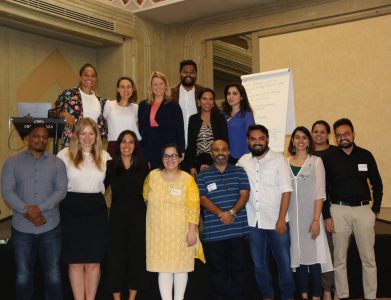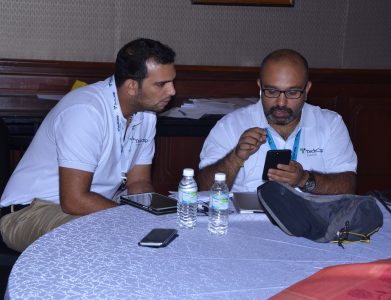“The single biggest problem in communication is the illusion that it has taken place.” – George Bernard Shaw
When the TechCamp team approached me to be a volunteer trainer at their Chennai event in July, I was a little taken aback. A “Tech Tools for Startups” event and me? I found it a little complicated combination of sorts. However, now when I look back at the time I agreed to be a trainer for “Customizing Content for Different Markets,” I think it was one of the most energizing thing I have done in recent times. This, when I am always excited to engage with “new”.
And r winners…1st place goes 2team BINGA Bold Integrated Network for Geographic Access in Maldives #techcampCHN @IIPState @SamhitaDotOrg pic.twitter.com/2F9xmecICe
— U.S. Consulate General Chennai (@USAndChennai) July 21, 2017
Though the two-day long event was planned around helping young startups gain some knowledge and skills in technological tools they can use for their companies and initiatives, the fact that it had participation from India, Nepal, Sri Lanka, Bhutan and Maldives was what excited me the most. As a first time TechCamp trainer, it was during the very few engagements with the participants on the morning of Day 1 that I realized how important it was for them to know a basic fact of communication: Not properly framing and communicating a startup’s/company’s/enterprise’s core message will produce mediocre change efforts and dilute overall effectiveness, fading the goal one intends to reach.
For a startup, a honest communication strategy isn’t any more just about the tools they have. Those tools need to fit their market in a way that they are heard and seen by the right kind of people. An excellent communication strategy, on the other hand, will not only make the startup heard and seen, but also push the people to utilize the services/product and soon convert them into loyal customers. While startups seek rapid and sturdy growth, it is critical for them to understand that a good amount of time spent in researching and creating a communication plan with customers, cost, communication and convenience in mind can go a long way to validate their market fit and prevent them from being a sputter in the pan. As a trainer, one of the biggest goals I had in my mind was to make them understand that while their product/service might be amazing, if they fail to make it sound amazing as well they will fail to start the startup.
Making your communication CREATIVE & CONCISE ! #TechCampCHN @TechCampGlobal pic.twitter.com/yI3GYT1qOo
— Isha Arora (@ishaarorafly) July 21, 2017
And that is exactly what I utilized during my personal training sessions. Some amazing inspiring entrepreneurs came up for one-on-one engagement. One of the key realizations for me was that it is indeed a struggle for startups to communicate the amazing product they are here to sell. Too often, stuck in the concept and the features of the product, the startups fail to understand the importance of stepping in the shoes of the “user” and “buyer” (which can be different) and customize the message that goes along. As basic a mistake as this is, I was rather surprised to know that only a very few of them actually have undertaken an in-depth customer analysis and segmentation process to understand how the product is fitting the needs and wants of the consumers.
I took some amazing learnings/lessons from the two-day exciting event. One can call them more reinforcements:
- It is difficult to give a PITCH. However, what is more difficult is to decide exactly WHAT the pitch for the startup idea will include.
- Too often people fail to understand that it is important to create a communication plan. What people further fail is in understanding that there is no, single fit-for-all template. What people completely fail to understand that if your startup has two different products, you need two strategies for selling it. However, all strategies should go out of and flow into a larger organizational business plan.
- Communication today in the startup and business world is not what it used to be. There is too much content and the attention span of people is shrinking day by day. And therefore, it is only foolish to not create a plan towards being visible.
- Too much communication kills the purpose. You need to be there, but not annoyingly present.
- Listening is one of the key steps that startups fail to take. It is important to constantly listen to your customers. Are you there to merely sell? Or create a loyal set of users, of not just product but also services.
- Don’t follow and take up tools blindly. Learn to pick your tools according to what best fits your need.
Challenge track! So awesome knowing people from Maldives, India, Sri Lanka and Nepal! Inspiring! @_BlackMuses @TechCampGlobal #TechCampCHN pic.twitter.com/UgQU10p6Zb
— Dr. Suchi Gaur (she/her) (@sg4devpt) July 20, 2017
Over the two days at Chennai TechCamp, my key was the use of participatory liberating structures to mobilize the participants for better understanding. A great idea, if not presented well, if not communicated well, can just remain an idea in mind or paper. Which takes me back to the starting challenge of communication, the illusion that it has happened. And that remains the biggest challenge of the startup industry in present times. I saw some great startups which were not working well because they failed at communicating to the customers. I also on the other end saw some mediocre ones with great communication plans succeeding in their goals. The TechCamp reinforced in me that the startup industry, just like the development sector, needs a deep understanding of using innovative mechanisms along with strong evidence-based understanding of communication.


